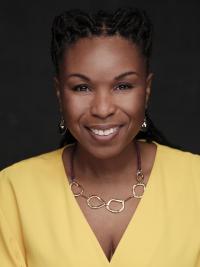
Jasmine McDonald Wins Presidential Teaching Award
Jasmine McDonald, assistant professor of epidemiology at Columbia Mailman School, has been awarded a prestigious Presidential Award for Outstanding Teaching from Columbia University President Lee Bollinger. The award recognizes her innovative teaching methods and contributions to academic learning, including her pivot to the digital classroom during the pandemic, as well as her exceptional mentorship and community service. She is one of eight faculty and instructors across the University honored with the award this year.
McDonald teaches Cancer Epidemiology, a class that offers a broad introduction to the subject, covering everything from cancer biomarkers and risk factors to study design and strategies for prevention. Above all, the professor seeks to give her students the skills to succeed wherever their public health career takes them.
“Not everyone taking my class will become a cancer epidemiologist. I want my students to have skills that are useful to them no matter what career they choose,” she says. “The class is designed to teach them critical thinking and communication skills. I want them to read with a critical eye and make a persuasive argument with evidence to back it up.”
The class has grown in popularity since McDonald took the reins in 2018. Last fall, 28 students enrolled—mainly master’s students, although doctoral students, medical fellows, and one emeritus professor have also taken the class.
The Online Classroom
When classes were forced online last spring, the School urged instructors to put a greater emphasis on asynchronous learning. This approach allows students to watch lectures on their own time, opening up classroom time to group exercises. “It was a big change from in-person learning where you can easily see if everyone is following the material,” McDonald says. “I had to find a new way to teach.”
Last fall, she had her Cancer Epidemiology students divide into groups online to collaborate using an app called Padlet. The professor and her TA monitored students’ progress and answered questions as they arose. “I found a way to be connected with students without being intrusive,” she says. “A lot of back-and-forth happened in the chat.”
McDonald expects to carry lessons from online teaching back to the physical classroom. “Asynchronous lecture materials are ideal for independent learning,” she says. “Allowing students to fast-forward, replay, or speed-up videos is ideal. I can also envision using online tools for in-person or hybrid learning.”
Community Service and Mentorship
McDonald, who since 2015 has served on the Department of Epidemiology’s Curriculum Committee, also guest-lectures for classes at Columbia Mailman and Columbia Nursing, offering her expertise on topics like environmental risks factors and racial and ethnic disparities in clinical outcomes. Sharing her knowledge as a breast cancer researcher, she has also given numerous presentations to community groups on the health risks of cosmetics and personal care products. Last year, she presented on the same topic as part of a Congressional briefing organized by Congresswoman Jan Schakowsky.
Her scholarship is supported by a grant from the National Cancer Institute. Just this week she was awarded a V Foundation Scholar grant to support her research into postpartum breast cancer risk. In 2016, she was the recipient of the Columbia Provost’s Grants Program for Junior Faculty who Contribute to the Diversity Goals of Columbia University.
Since 2015, McDonald has served as co-director with Professor Mary Beth Terry of a pipeline program that provides research internships and mentoring to high school and undergraduate students from under-represented groups and/or coming from limited socioeconomic resources. Offered through the Herbert Irving Comprehensive Cancer Center (HICCC), Columbia University Irving Medical Center, the eight-week Continuing Umbrella of Research Experience (CURE) Program is one of few university programs that provide long-term lab-based opportunities for high school students. In addition, at HICCC, she plays a leadership role on decisions related to education and training, as well as community outreach and engagement.
She has also led conversations on racial justice as a co-facilitator and discussion lead with Professor Rachel Shelton for a schoolwide conversation around Ibram X. Kendi’s book How to Be an Antiracist, and panelist and committee member for the 400 Years of Inequality Grand Rounds lecture series commemorating the first arrival of African people to Jamestown, Virginia.
A Special Connection
A survey of students taking Cancer Epidemiology revealed one major reason why they enroll: most had experienced cancer in their family. At the start of the course, McDonald always asks students if there is a particular topic in cancer they want to learn about. Last fall, one student suggested brain cancer, and the professor added the subject as one of the course’s examples in a section on cancer prevention. The example related to a 2018 National Cancer Institute announcement of a “multi-omic” therapy to improve pediatric brain tumor survival.
“I added an example about young people and brain cancer that addressed what this student and her family were going through,” McDonald recalls. “After our last class, she stayed on to talk. She was in tears. She thanked me for what she learned and told me how she would share this knowledge with her family. I teach for moments like that one.”
